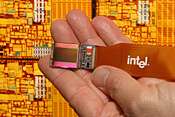Intel Delays LCOS chips for HDTV

Intel President and Chief Operating Officer Paul Otellini in January 2004 demonstrated Intel silicon technology that was expected to bring about high-definition, large-screen TVs with clearer pictures than current systems for less than $2,000. However, Intel said on Monday that it will not come out with a chip for projection television sets this year. The world's largest chip maker had decided to improve picture quality before introducing the product.
The new Intel technology, code-named Cayley, is based on a technique called Liquid Crystal on Silicon (LCOS), which is used to create small chips called microdisplays that produce images that are displayed on large-screen, rear projection TVs
LCOS technology sandwiches a layer of liquid crystal between a cover glass and a highly reflective, mirror-like surface patterned with pixels that sits on top of a silicon chip. These layers form a microdisplay that can be used in projection displays such as large-screen, rear-projection TVs. Intel's Cayley LCOS technology uses Intel's advanced silicon manufacturing processes to produce a high-quality surface for reflecting light which creates an extremely bright display.
Intel's Cayley LCOS technology is based on an all digital design that produces a sharper, more precise image than other architectures based on analog technology.
Another key aspect of the LCOS technology is that it enables the creation of multiple microdisplays with increasing levels of resolution without changing size of the microdisplay. The consistent and compatible display area of microdisplays based on Intel's LCOS technology will enable OEMs to re-use light engine designs for a wide array of products in various screen sizes and resolutions, thus reducing their development costs.
Intel planned to deliver microdisplays based on Cayley in the second half of this year.
















